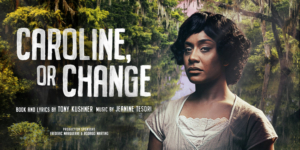Review: CAROLINE, OR CHANGE Sets A New Style Of Musical While Contemplating Change From The Simplest Nickels And Dimes To Major Movements Of Social Equality

Wednesday 28th August 2019, 7:30pm, Hayes Theatre
Under Mitchell Butel's direction, Tony Kushner (book and lyrics) and Jeanine Tesori's (music) CAROLINE, OR CHANGE contemplates the shifting social landscape of America in 1963. With the whimsical absurdity of singing appliances and the realties of human connection, the need to embrace change is considered through stories not often seen on the musical theatre stage.
The Caroline of the title is Caroline Thibodeaux (Elenoa Rokobaro), a 39 year old African American single mother who makes a living as a maid for the Gellman family in Lake Charles Louisiana. While 1963 America is in the midst of change with Martin Luther King's Civil Rights Movement and a progressive President Kennedy promising change for the African American Community, there has been change in the Gellman house following the death of Stuart Gellman's (Andrew Cutcliffe) wife and his somewhat hasty marriage to her best friend Rose Stopnick (Amy Hack). Stuart is still grieving, Rose is trying to find a place for herself, far from her home of New York, and Stuart's 8 year old son Noah (performed by Ryan Yeates on night reviewed, role shared with Daniel Harris) hates his new stepmother, favouring Caroline's company instead. The relationship between Caroline and Noah shifts as she is given permission to keep the change the child carelessly leaves in his pockets. Initially opposed to the idea of taking money from a 'baby', she realises that it is a necessary evil to supplement her meager $30 a week salary but money changes people.
The world is presented from Caroline's view of life which has led to a somewhat bizarre relationship with the appliances that surround her in the Gellman's basement and an often one dimensional exaggerated view of the people around her. The Washing Machine (Ruva) is a helpful appliance so has a strong guiding voice while the Dryer (Elijah Williams) adds an oppressive heat to the already stuffy basement so Caroline believes it is sent by the devil. The Radio (Alexandra Fricot, Emily Havea, Ruva) keeps her company with a Supremes style Motown trio that for a Greek Chorus of sorts and though not an appliance, the Moon (Ruva) is a calm force watching over her world. The charicaterisation of the humans depends on the degree of interaction Caroline has with them, from a more intricate understanding of Noah who she has known for years, a brasher caricature of Rose who is new to the house and an initial impression of young innocence for Caroline's 16 year old daughter Emmie (Nkechi Anele) who Caroline has potentially not realised has grown up and understands more of the world than her mother expected.
Set predominantly in the Gellman's home, Set Designer Simon Greer has transformed the Hayes Theatre into a multi storey timber house surrounded by the lush greenery of Louisiana. The receding darkness beneath the house, beyond the basement helps remind the audience that Caroline works 16 Feet Beneath The Sea while Noah's bedroom is easily converted to a kitchen where Caroline, Dotty (Emily Havea) and Emmie help prepare the Gellman's Chanukah party. Alexander Berlage's lighting helps delineate the real world from Caroline's imagination with a calming spotlight on the moon, bolder theatrical lights for the Radio and an ominous red when the Dryer is put to work. Spotlights also help separate internal thought from outward expression, particularly amusing in Rose's numbers. The divide between reality and imagination is further reinforced with Melanie Liertz's costume design which has the appliances and the moon presented with bright sparkle and shine and the humans with more subdued styles of general wear.
With an almost entirely sung through score, under Lucy Bermingham's musical direction, this is an unusual musical, leaning more towards the opera genre but with music that ranges from gospel spirituals, blues, Motown, classical, Jewish Klezmer and folk. There are a few more traditional 'numbers' but most of the work just forms part of the storytelling with sung dialogue.
At first the story takes a while to warm but when conflict starts to rise as Caroline is forced to face the changing world around her Elenoa Rokobaro really gets to shine, showing the mixed emotions of a mother trying to survive and put food on the table for her children. While the inequality of the racial divide is well known, Rokobaro ensures that the audience see a human reality of an African American woman who knows she needs to keep the white employers happy if she wants to keep her job.
Other standouts are Emily Havea as Caroline's friend Dotty, a strong character who tries to help Caroline see a different future and accept that people, including Emmie, want to fight for change. Ruva shifts wonderfully from the operatic moon to a Motown diva Washing Machine and Radio Trio while Amy Hack delivers a hilarious energetic expression of the new housewife wanting to make her mark on the Gellman home but not quite finding her feet.
CAROLINE, OR CHANGE is an intriguing work that grows on you as the story progresses. Filled with a wonderfull array of well executed music, this is an interesting experience for anyone adventurous enough to try something a little different to mainstream musical theatre.
Comments

Videos

